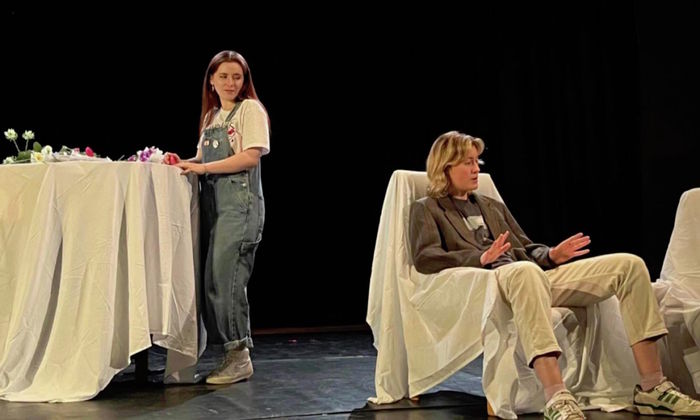The Magic Flute Review: CUOS opera showcases the magic of music
Impressive display of musical talent captivates in a somewhat streamlined vision of Mozart’s magical kingdom

With a flourish from the conductor, the orchestra are set in motion, with delicate strings, bold brass, and of course, a magic flute. Cambridge University Opera Society bring Mozart’s famous opera to the West Road Concert Hall in a new, minimalist, and English production. The opera follows the exploits of prince Tamino (James Grant), who is sent on a quest to rescue The Queen of the Night’s (Imogen Rowe) beautiful daughter, Pamina (Hannah Dienes-Williams), from the evil Sarastro (George Butler). But all is not as it seems and his journey has many twists and turns, arias and overtures.
Part of me wishes we could have heard the original German, to hear how the lyrics combine with the melodies, but the English translation certainly makes it easier to follow, and perhaps more widely appealing. The themes of the story, though, could do with modern translation, since the plot essentially hinges on rampant misogyny. Yes, you stage Mozart for the music, but even a few awkward expressions or angry gestures from the female characters would go a long way to indicate the production’s awareness of the backward themes, instead of ignoring them.
“The cast guide the narrative through delicate sorrows to defiant valour and melodies of love”
Mozart’s music underpins the opera, with the magic of music at the forefront of the plot, and the orchestra performs with a consistent display of skill, guiding the narrative through delicate sorrows to defiant valour and melodies of love. The cast display a similar wealth of talent, the singers showcasing their technical abilities across powerful solos and blended choral harmonies. Understudy, Imogen Rowe, deserves special commendation for her impressive rendition of the famous, and technically challenging, Queen of the Night’s aria. The standout performance is undoubtedly Hannah Dienes-Williams’s Pamina, showcasing her vocal range and powerful delivery, alongside clear articulation that made the audience feel her every emotion. Alex Semple similarly gave a wonderful rendition as the comic Papageno, infusing his strong vocal performance with an energy that made the character come alive.
Semple’s vivacity, however, was notable partly because it was lacking elsewhere. Opera has big, bold musical scores that allow you to give big, bold performances. Often the performers felt dwarfed on the large stage, especially during spoken scenes, staying rooted in place and delivering their lines like a singer, rather than a performer. Matt Supramaniam’s Monostatos illustrated the potential of large, extravagant actions—he pranced, skulked, hid behind scenery, and generally filled the entire space with his characterful performance.
The staging, too, could have benefitted from a little extravagance, since the ‘minimalist’ set felt somewhat uninspired. The LED tree gave a nice feel, but columns are often the easy answer for student theatre and there is so much symbolism in the opera that could be accentuated by the scenery. By contrast, the prominent use of props is clever and effective: the large lock over the verbose Papageno’s face is a nice touch, while the skeletal serpent puppet added magic and drama—it’s a shame it wasn’t repurposed later, perhaps during Tamino’s trial, which was sadly underwhelming.
In general, CUOS’s The Magic Flute perhaps lacks the splendour available from Mozart’s opera, but it is a wonderful evening filled with songs, tales of love, tribulation, and the redeeming magic of music.
The Magic Flute is showing at the West Road Concert Hall from the 23rd to the 25th of February, 7.45pm
 News / Cambridge student numbers fall amid nationwide decline14 April 2025
News / Cambridge student numbers fall amid nationwide decline14 April 2025 News / Greenwich House occupiers miss deadline to respond to University legal action15 April 2025
News / Greenwich House occupiers miss deadline to respond to University legal action15 April 2025 Comment / The Cambridge workload prioritises quantity over quality 16 April 2025
Comment / The Cambridge workload prioritises quantity over quality 16 April 2025 Sport / Cambridge celebrate clean sweep at Boat Race 202514 April 2025
Sport / Cambridge celebrate clean sweep at Boat Race 202514 April 2025 Features / The TikTok college: using social media in access and outreach15 April 2025
Features / The TikTok college: using social media in access and outreach15 April 2025






